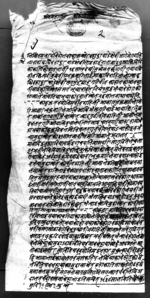A jabānabandī submitted to the Adālata Bandobasta Aḍḍā by Śamaśera Bahādura Pā̃ḍe (VS) 1934
ID: K_0175_0002
Edited and
translated by Rajan Khatiwoda
in collaboration with
Manik Bajracharya
Created: 2016-01-09;
Last modified: 2017-04-26
For the metadata of the document, click here
The accompanying edition, translation/synopsis and/or commentary are available under the terms of the Creative Commons Attribution-ShareAlike 4.0 International License
Abstract
This document is a jabānabandī submitted by Śamaśera Bāhādura Pā̃ḍe, a resident of Naradevī Ṭola, to the Adālata Bandobasta Aḍḍā. It mentions that since he has been arrested and his property confiscated, he is unable to cause the defendant, Rājakumārī Pãḍenī Kṣatryānī, to appear in court and make her confess, as stated by him previously in a separate complaint note submitted to the court (see K_0175_0018).Diplomatic edition
[1r]
श्री\श्री३महाराज१श्रीकोटिलिङ्
२सहिSeal1लिषितम् नरदेविटोलवस्न्यासम्सेरवहादुरपाडेक्षेत्रीआगेमेराठाहि
2लावावापृथिवहादुरपाडेक्षेत्रीलाईहाडनातामा४पुस्ताकिदिदि
3काकर्णिकोवातलागि१६सालदेषीमध्यैसतर्फभागीगयापछि
4नीजकिज्येठीमुषेनीराजकुमारीलाईआफ्नाविवाहितालोग्न्यापृ
5थिवहादुरपाडेक्षेत्रीसगभेट्घाट्गरीनीजकाहातकाभातपा
6नीषाईकर्णिस्मेतसंसर्गभयावावत् जिय१सुद्धभंन्यावेहोराको
7१८सालैमापतियाभयाकोहुनालेस्मेत् २६सालमाथापाथलि
8¯१¯ ¯का हुकुम् वमोजिम् नीजठाहिलीआमाराजकुमारीलेरमे
9रिआमारत्नकुमारिलेआधिआधिअंसगरीषाईषाईआयाकिरहिछ
10न्हाम्रानारायणीभंन्यास्मेत् ज्मा६गुठीनीजठाहिलीआमालेमा
11त्रचलन् गरिआयाकिहुनालेनीजलेमात्रचलन् गरीषानरहाम्रोवं
12डाभयाकोढुकुटिवलमिचिचलन् गर्ननीजलेपाउन्याहोइनभं
13न्यामुद्दास्मेत्को३१सालमानीजमेरीआमालेअदालत ¯२¯ ¯
14मा वादिइजहारदियापछीइटाचपलिमासर्दारसोगुठितैलेचला
15उनुभनीलेषिदियाकिहुनालेभत्केविग्र्याकोस्मेतमैलेवनाईचलन्
16गर्याकिहुंअवंडाढुकुटिदवाईषानरत्नकुमारीलेमात्रपाउन्याहोइ
17नभंन्यामुद्दास्मेत्कोनीजठाहिलीआमालेप्रतिवादिदिसोधनमा
18लमास्मेत् हामिलाईप्रकाउगर्दाहाड्नातामाकर्णिगर्यामाजातप
19तितभैसुद्रसरहमागयाकाआफ्नालोग्न्यासगसवैवेहोराथाहापा
20ईजानीजानीसगलागीभातपानीमाभजिआयापछिपानीकोमात्रप
21तियापाञाँभनीजातभात् वाहेकभयापछीकौनैवेहोरालेपनीअं
22सनपाउन्यालेफुलेईफकाईढाटीअंसलिनपाउन्याहोइनवुझदा
23जातभात् वाहेककिवाहेकैछन् भंन्याइत्यादिमुद्दास्मेत्कोनीजठा
24हिलीआमाकानाउमामैले¯१¯ ¯का हजुरमाविंतिपत्रचढाउदा
25रनीजलाईभयाकापतियाकामाथिलेषियाकोफारककोनकलस्मेत्
26वुझियस्मुद्दामाकसोभयाकोहोभयाकोवेहोरानढाटिसाचोभन
27भनीमसगसोद्धामेरोचित्तवुझ्योनीजठाहिलीआमालेसवैगुठिगन्
28चलाइन्ढुकुटिदवाईषाकिछन् भनीपक्रिन् भंन्यावेहोराले
29मात्रलेषियाकोमुद्दाउठाईविंतिपत्रमाचह्रायाकोहुंअदालत्मा
30तोकाईलगीरसोविंतिपत्रवमोजिमइजहारमुचुल्कादीनीजजेठि
31आमालाईकायेलगर्नमसकतिनलेषियाकावेहोराको मै
32लेविंतिपत्रचह्रायाकामुद्दामाऐन् एहाकानिसाफलेजोठहर्छ
32मसामेलछुभनीमेरामनोमानषुसिराजिसगज्मानवंदीलेषिअ
33दालत् वंदोवस्तमाचह्राञाँइतिसम्वत्१९३४सालमितिचैत्र
34सुदि१३रोज२शुभम्¯¯ ¯¯¯¯¯¯¯¯¯¯¯
Translation
[1r]
Thrice Venerable Mahārāja
1
Venerable Koṭiliṅga
2
Signed
[The following] has been written by Śamaśera Bahādūra Pā̃ḍe Kṣetrī, resident in Naradevī Ṭola. After my fifth paternal uncle Prithī Bahādūra Pā̃ḍe, accused of committing adultery with a 4th-generation female blood cousin, fled to Madhesa (i.e., Terai) in [VS 19]16, expiation was granted to his eldest wife, Rajākumārī, in [VS 19]18, the details [of which are as follows]: “The 1 body [of Rājakumāri] has been purified. [She had been polluted] by reason of having met her own ritually married husband, Pṛthī Bahādūra Pā̃ḍe Kṣetrī, of having received rice and water from his hand and even of having engaged in sexual intercourse with him." For that reason, by order of ---1--- (i.e., Thrice Venerable Mahārāja), Thāpāthalī, in [19]26, my fifth paternal aunt Rājakumārī and my mother Ratnakumārī, as it turned out, partitioned the [family] property, with each receiving half.
Since my fifth paternal aunt alone had been enjoying our 6 guṭhīs, including the one called Nārāyaṇī, my mother filed a lawsuit in [19]31 as a litigant [against] her at the ---2--- (i.e. venerable Koṭiliṅga) court, stating: “She [Rājakumārī] is not entitled to enjoy [the guṭhīs] on her own, and [she also] should not be allowed to enjoy our part of the partitioned grain stores by force.” Afterwards, when [the lawsuit] was forwarded to the Iṭācapalī, Rājakumārī, [my] fifth paternal aunt, filed a defence appeal, stating: “Given that [Ratnakumārī] gave [me] a written statement as follows: ‘You shall run the guṭhī’’, I have enjoyed it, reconstructing what was in disrepair. Ratnakumārī is not entitled to enjoy the unpartitioned treasury on her own.”
Thereafter this property [was confiscated] and we were arrested. Then I submitted a petition to ---1--- (i.e. Thrice Venerable Mahārāja) against my fifth paternal aunt together with the following lawsuit: “[A woman]—one who has willingly eaten cooked rice and received water from [her husband] even after knowing that he has lost his caste status down to the equivalent of a śūdra as punishment for committing adultery with a blood relation—should not under any circumstances get her share of property on the grounds that she has been granted water expiation, while still excluded from having rice with fellow caste members. She should not get her share of property just by inveigling and lying. According to my inquiry, she is still excluded from having rice together with fellow caste members.”
When I was asked about my inquiry into the copy of the phāraka mentioned above regarding the expiation and told to relate truthfully, without lying, the details of what had happened during that lawsuit, I readily consented.
I have submitted this petition with regard only to the lawsuit whereby my fifth paternal aunt caused us to be arrested [on the basis of the accusation] that my mother had been running all the guṭhīs and had been enjoying the treasury by force. While having appeared in court with the established facts, provided testimony and submitted a deposition in line with the petition [submitted to you earlier], I am unable to convince my first paternal aunt [to support my claims].
I have willingly submitted this jabānabandī to the Adālata Bandobasta Aḍḍā. I shall accept the decision, made in accordance with the Ain and your judgement, regarding the petition and lawsuit I initiated, the details of which are written [above].
Monday, the 13th day of the bright fortnight of Caitra in the year [Vikrama] era year 1934.
Commentary
For a related document, see K_0175_0018.

